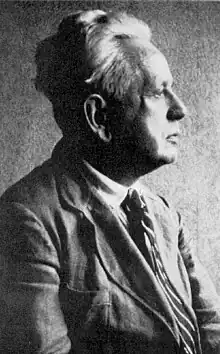Cassirer–Heidegger debate
In 1929 Ernst Cassirer took part in a historically significant encounter with Martin Heidegger in Davos during the Second Davos Hochschulkurs, (the Cassirer–Heidegger debate). Cassirer argues that while Kant's Critique of Pure Reason emphasizes human temporality and finitude, he also sought to situate human cognition within a broader conception of humanity. Cassirer challenges Heidegger's relativism by invoking the universal validity of truths discovered by the exact and moral sciences.
 | .jpg.webp) |
| Cassirer | Heidegger |
Background
The Cassirer–Heidegger debate was an encounter between the philosophers Martin Heidegger and Ernst Cassirer from March 17 to April 6, 1929 during the Second Davos Hochschulkurs (Davos University Conference) which held its opening session in the Hotel Belvédère in Davos on 17 March 1929.[1] Cassirer gave four lectures and Heidegger gave three lectures. The debate was about the significance of Kantian notions of freedom and rationality.
Cassirer argues that while Kant's Critique of Pure Reason emphasizes human temporality and finitude, he also sought to situate human cognition within a broader conception of humanity. Cassirer challenges Heidegger's relativism by invoking the universal validity of truths discovered by the exact and moral sciences.[2][3][4][5] Later in 1929, Heidegger wrote Kant und das Problem der Metaphysik (1929). Rudolf Carnap[6] and Joseph B. Soloveitchik were also in the audience at Davos.
Legacy
In Continental Divide: Heidegger, Cassirer, Davos (Harvard University Press, 2010), Peter E. Gordon reconstructs the debate between Heidegger and Cassirer, demonstrating its significance as a point of rupture in Continental thought that implicated all the major philosophical movements of the day.[7][8][9][10] Continental Divide was awarded the Jacques Barzun Prize from the American Philosophical Society in 2010. A colorful recap of this debate also appears in the final chapter of Wolfram Eilenberger'sTime of the Magicians.[11]
See also
Notes
- Friedman (2011:1).
- Schalow, Frank (November 2012). "Revisiting the Heidegger–Cassirer Debate". Comparative and Continental Philosophy. 4 (2): 307–315. doi:10.1179/ccp.4.2.b536328017k87538. ISSN 1757-0638. S2CID 144554592.
- "When Philosophy Mattered". The New Republic. 13 January 2011. Retrieved 26 November 2018.
- Hamburg, Carl H. (1964). "A Cassirer-Heidegger Seminar". Philosophy and Phenomenological Research. 25 (2): 208–222. doi:10.2307/2105394. JSTOR 2105394.
- Waite, Geoffrey (1998). "On Esotericism: Heidegger and/or Cassirer at Davos". Political Theory. 26 (5): 603–651. doi:10.1177/0090591798026005001. JSTOR 191766. S2CID 143447238.
- Friedman (2011:7).
- Isaacs, Alick (11 May 2013). "Continental Divide: Heidegger, Cassirer, Davos by Peter E. Gordon (review)". Common Knowledge. 19 (2): 393–394. doi:10.1215/0961754X-2073649. ISSN 1538-4578.
- McGrath, Larry (2011). "Continental Divide: Heidegger, Cassirer, Davos (review)". MLN. 126 (5): 1140–1144. doi:10.1353/mln.2011.0085. ISSN 1080-6598. S2CID 162012327.
- Wolin, Richard (1 April 2012). "Peter E. Gordon. Continental Divide: Heidegger, Cassirer, Davos. Cambridge: Harvard University Press. 2010. Pp. xiv, 426. $39.95". The American Historical Review. 117 (2): 598–600. doi:10.1086/ahr.117.2.598-a. ISSN 1937-5239.
- Winters, David (2012). "Peter E. Gordon, Continental Divide: Heidegger, Cassirer, Davos". Radical Philosophy. 172: 61.
- Eilenberger, Wolfram (2021). Time of the Magicians: Heidegger, Benjamin, Cassirer and Wittgenstein. Penguin. pp. 325–334.
References
- Otto Friedrich Bollnow and Joachim Ritter, "Davoser Disputation zwischen Ernst Cassirer und Martin Heidegger" (transcription: March 25, 1929), in Martin Heidegger, Kant und das Problem der Metaphysik, 5th ed., Vittorio Klostermann, 1991, Appendix IV, pp. 274–96. In English as "Davos Disputation Between Ernst Cassirer and Martin Heidegger," in Kant and the Problem of Metaphysics, 4th ed., Indiana University Press, 1990, pp. 171–85.
- Michael Friedman, A Parting of the Ways: Carnap, Cassirer, and Heidegger (Open Court, 2011 [2000]).
Further reading
- Truwant, Simon (2022). Cassirer and Heidegger in Davos : The Philosophical Arguments. Cambridge, United Kingdom: Cambridge University Press. ISBN 978-1-009-01956-9. OCLC 1295619732.